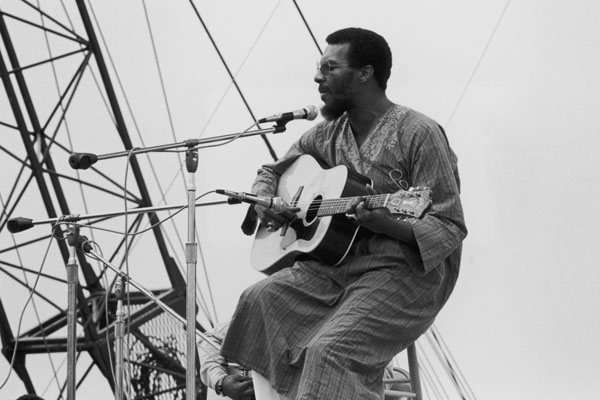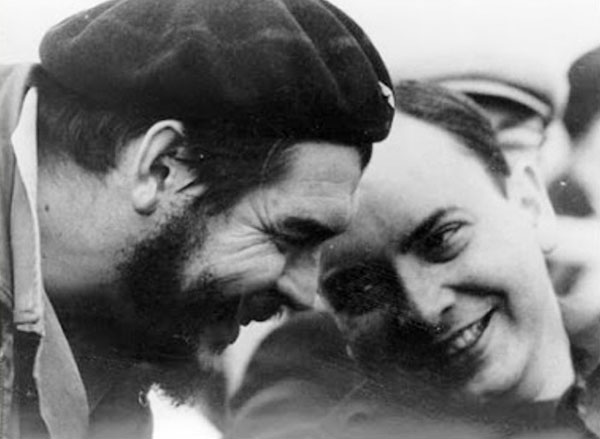A couple of weeks ago, Chicago music critics Jim DeRogatis and Greg Kot paid tribute to the late Roger Ebert by replaying their 2006 interview with him for Sound Opinions. The conversation naturally focused on music and the movies, and Ebert argued that Woodstock (1970) is not only one of the best concert films ever made, it’s also one of the best films, period, ever made. As you’ll have heard, Richie Havens, the first act to walk out onto that iconic stage, died yesterday morning of a heart attack. He was 72.
“He had been scheduled to go on fifth, but major traffic snarl-ups delayed many of the performers,” notes Derek Schofield in the Guardian‘s obituary, “so he was put on first and told to perform a lengthy set. He entranced the audience for three hours, being called back time and again for encores. With his repertoire exhausted, he improvised a song based on the spiritual ‘Motherless Child.’ This became ‘Freedom,’ his best known song and an anthem for a generation. His inclusion on the subsequent film of the festival—where he can be seen strutting around the stage, pouring every ounce of emotion into the song—further enhanced his reputation. The song was included on the soundtrack of Quentin Tarantino’s 2012 slavery-era film Django Unchained.” Besides chalking up a pretty amazing recording career, Havens also dabbled in acting: “He starred in the original stage performance of the Who’s Tommy in 1972 and took the lead role in Catch My Soul, the 1974 film based on Othello. He co-starred with Richard Pryor in the 1977 film Greased Lightning.”
“Alfredo Guevara Valdés, a Marxist intellectual and ally of Fidel Castro who presided over Cuba’s powerful state-financed film industry and its many acclaimed movies for much of the Castro era, died here on Friday,” reports Victoria Burnett in the New York Times. He was 87 and clearly had an incredible impact on Cuban culture. “Some believe it was Mr. Guevara’s knowledge of Marx that helped put Mr. Castro on the path to communism…. While Mr. Castro was fighting in the Sierra Maestra, Mr. Guevara was in Mexico, where he worked with Luis Buñuel on the 1959 movie Nazarín…. Mr. Castro, who saw cinema as a tool of mass education and as a means of creating a national consciousness, appointed Mr. Guevara to create the Cuban Institute of Cinematographic Art and Industry, known as Icaic, which used generous state financing to become a virtual film monopoly and the most influential cultural institute on the island…. Mr. Guevara also established a sound studio that became the cradle of a new Cuban music, nueva trova, and oversaw the advent of the bold silk-screen movie posters that became identified with Cuban film.”
Award-winning filmmaker and ethnologist Jacqueline Veuve, who collaborated with Jean Rouch and Richard Leacock, passed away on Thursday, aged 83. The Swiss Film Academy presented an Honorary Award to her in March, noting that she was “the undisputed doyenne of Swiss documentary filmmaking. Through her body of work, she has become an unofficial custodian of Switzerland’s collective memory.”
And Reuters reports that Allan Arbus, “best known for his role as Army psychiatrist Sidney Freedman on the 1970s hit television series M*A*S*H and as the husband of the late photographer Diane Arbus, has died at the age of 95.”
For news and tips throughout the day every day, follow @KeyframeDaily on Twitter and/or the RSS feed. Get Keyframe Daily in your inbox by signing in at fandor.com/daily.





